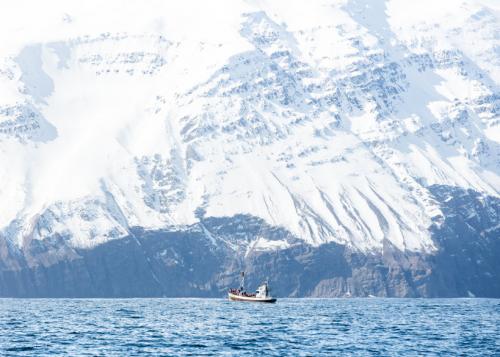This preliminary research explored food and drink innovation and clustering in Scotland’s Highlands and Islands and reviewed potential opportunities for engagement with partners in the Arctic region. It addresses the Scottish Government’s Arctic Policy Framework, which seeks to reinforce and promote Scotland’s connections with northern countries.
The research report (or summary) outlines the economic and policy contexts of the Arctic region, drawing out contrasts and similarities with the Highlands and Islands. It examines official data for evidence of food and drink clusters in the Highlands and Islands and, using a case study of the European Union’s protected names schemes, engagement with geographical indications. Aspects of the values and behaviour of food and drink entrepreneurs are explored using new data from a separate Scottish Government-funded research project. The report concludes by reflecting on innovation and clustering in the food and drink sector in Scotland’s Highlands and Islands and suggests avenues for further work and engagement.

Stage
Directory of Expertise
Purpose
In September 2019, the Scottish Government launched its first Arctic Policy Framework. This followed increasing engagement with the Arctic, primarily through the Arctic Circle Assembly, the largest network for international dialogue and cooperation on the future of the region. The Scottish Government has had Ministerial attendance at the last three Arctic Circle Assemblies and hosted an Arctic Forum event in 2017. These reinforced Scotland’s, and particularly the Highlands and Islands’, close connections with northern countries and highlighted shared opportunities and challenges in terms of culture, demography, connectivity, economy and sustainability.
This SEFARI Gateway Fellowship was set up to identify potential opportunities for the Highlands and Islands’ food and drink sector to engage with partners in the Arctic region, in the context of the United Nations’ Sustainable Development Goals. The immediate stimulus for this was the proposal to develop an Arctic Foods Innovation Cluster, initiated by researchers at the University of Saskatchewan with endorsement from the Arctic Council’s Sustainable Development Working Group.
Three areas of interest formed the objectives for the Fellow’s report:
- The Highlands and Islands as a food producing region (e.g. regional attributes such as provenance) and potential for engagement with the Arctic region;
- Cluster models and the identification of clusters in the Highlands and Islands’ food and drink sectors;
- Innovation in the Highlands and Islands’ food and drink sectors.
Results
The Highlands and Islands and Artic regions are characterised by: small, dispersed and economically fragile communities; limited employment opportunities; suboptimal transport and communications infrastructures; and remoteness from centres of economic and political power. However, their marginalisation is as much a product of connectedness as isolation: it arises in large part from the operation of wider political and economic forces.
Cluster policies for marginalised regions often focus on retaining a greater share of the value added to natural resources extracted and exported from them. For the Highlands and Islands, this could be broadened to include long-established types of enterprise, e.g. fisheries and farming, which may appear to lack high growth potential or technological innovativeness.
This is because other forms of innovation can also have economic benefits. The potential of geographical branding is exemplified by Highlands and Islands producers’ relatively high levels of engagement with EU protected names schemes. Marketing innovations are also linking producers and consumers more directly: e.g. farmers’ markets and Support Local. These could help the Highlands and Islands and Arctic regions retain more of the value added to their food and drink products.
Meat and fish production and harvesting are important in both regions. However, they generate potential conflicts between Sustainable Development Goals (SDGs). A focus on partnerships (SDG17) to achieve Gender Equality (SDG5) and responsible production and consumption (SDG12) may be a means of seeking to balance Decent Work and Economic Growth (SDG8) and Industry and Innovation (SDG9) with Climate Action (SDG13), Life Below Water (SDG14) and Life on Land (SDG15).
Benefits
This SEFARI Gateway Fellowship produced five benefits. First, its report is a basis for dialogue between policy makers and the communities and food and drink enterprises of the Highlands and Islands which, while they may benefit from involvement with the Arctic Region, will be the ones who will have to build and sustain engagement with it.
Secondly, it provides a resource for thinking about and constructing social and economic development policies that work with and for communities and enterprises in the Highlands and Islands. As such, it advocates development of, rather than just development in, the region. This is long-term work, but is a necessary complement to traditional cluster-based economic development policies that seek to promote technologically innovative and high-growth industries in marginalised regions.
Thirdly, the report identifies ‘gaps’ that research can help and is helping to fill. For example, the relatively high levels of engagement with geographical indications from food and drink enterprises in the Highlands and Islands, and the lack of published studies of their impact, generate questions that are informing current research in the Scottish Government’s Environment, Food and Agriculture Strategic Research programme. This links with Alexandre Foito’s SEFARI Gateway Fellowship on authenticity, provenance and traceability in Scottish food products.
Fourthly, this Fellowship identified opportunities to develop and share insights from research and policy with potential partners in the Arctic Region and set out practical steps for putting that into practice. Lastly, it links with a Highlands and Islands Enterprise and SEFARI Think Tank on COVID19 recovery and resilience in the rural economy.